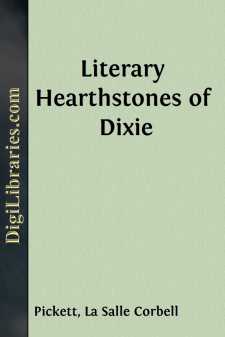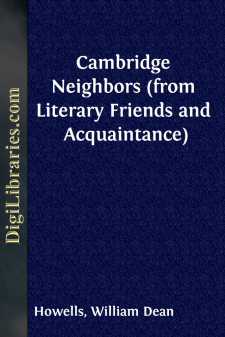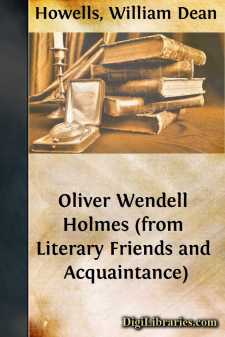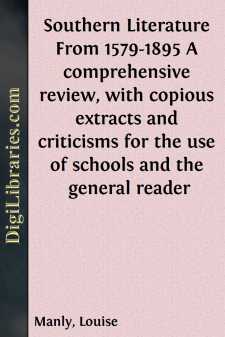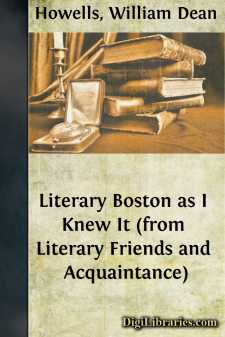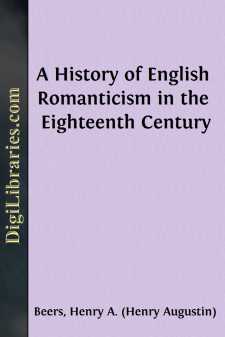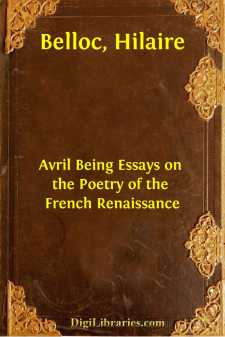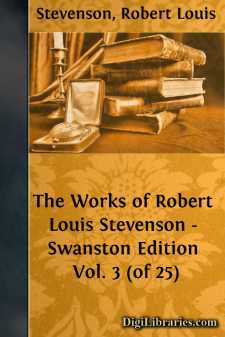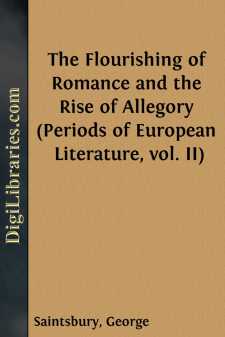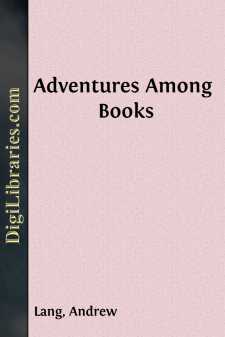Literary Criticism
- American 18
- Ancient and Classical 3
- Asian 1
- Australian & Oceanian 1
- Books & Reading 8
- Caribbean & Latin American 2
- Drama 2
- English, Irish, Scottish, Welsh 49
- European 7
- General 37
- Horror 1
- Humor 2
- Jewish 2
- Medieval 2
- Middle Eastern 3
- Poetry 7
- Renaissance 6
- Russian & Former Soviet Union 1
- Shakespeare 27
Literary Criticism Books
Sort by:
"THE POET OF THE NIGHT" "I am a Virginian; at least, I call myself one, for I have resided all my life until within the last few years in Richmond." Thus Edgar A. Poe wrote to a friend. The fact of his birth in Boston he regarded as merely an unfortunate accident, or perhaps the work of that malevolent "Imp of the Perverse" which apparently dominated his life. That it...
more...
Being the wholly literary spirit I was when I went to make my home in Cambridge, I do not see how I could well have been more content if I had found myself in the Elysian Fields with an agreeable eternity before me. At twenty-nine, indeed, one is practically immortal, and at that age, time had for me the effect of an eternity in which I had nothing to do but to read books and dream of writing them, in...
more...
Elsewhere we literary folk are apt to be such a common lot, with tendencies here and there to be a shabby lot; we arrive from all sorts of unexpected holes and corners of the earth, remote, obscure; and at the best we do so often come up out of the ground; but at Boston we were of ascertained and noted origin, and good part of us dropped from the skies. Instead of holding horses before the doors of...
more...
by:
Louise Manly
PREFACE. T primary object of this book is to furnish our children with material for becoming acquainted with the development of American life and history as found in Southern writers and their works. It may serve as a reader supplementary to American history and literature, or it may be made the ground-work for serious study of Southern life and letters; and between these extremes there are varying...
more...
I do not think that such a fact would now move the fancy of the liveliest newspaper man, so much has the West since returned upon the East in a refluent wave of authorship. But then the West was almost an unknown quality in our literary problem; and in fact there was scarcely any literature outside of New England. Even this was of New England origin, for it was almost wholly the work of New England men...
more...
CHAPTER I. The Subject Defined To attempt at the outset a rigid definition of the word romanticism would be to anticipate the substance of this volume. To furnish an answer to the question—What is, or was, romanticism? or, at least, What is, or was English romanticism?—is one of my main purposes herein, and the reader will be invited to examine a good many literary documents, and to do a certain...
more...
by:
Hilaire Belloc
MY DEAR ECCLES, You will, I know, permit me to address you these essays which are more the product of your erudition than of my enthusiasm. With the motives of their appearance you are familiar. We have wondered together that a society so avid of experience and enlargement as is ours, should ignore the chief expression of its closest neighbour, its highest rival and its coheir in Europe: should ignore,...
more...
These studies are collected from the monthly press. One appeared in the New Quarterly, one in Macmillan’s, and the rest in the Cornhill Magazine. To the Cornhill I owe a double debt of thanks; first, that I was received there in the very best society, and under the eye of the very best of editors; and second, that the proprietors have allowed me to republish so considerable an amount of copy. These...
more...
PREFACE. As this volume, although not the first in chronological order, is likely to be the first to appear in the Series of which it forms part, and of which the author has the honour to be editor, it may be well to say a few words here as to the scheme of this Series generally. When that scheme was first sketched, it was necessarily objected that it would be difficult, if not impossible, to obtain...
more...
by:
Andrew Lang
CHAPTER I: ADVENTURES AMONG BOOKS I In an age of reminiscences, is there room for the confessions of a veteran, who remembers a great deal about books and very little about people? I have often wondered that a Biographia Literaria has so seldom been attempted—a biography or autobiography of a man in his relations with other minds. Coleridge, to be sure, gave this name to a work of his, but he...
more...


